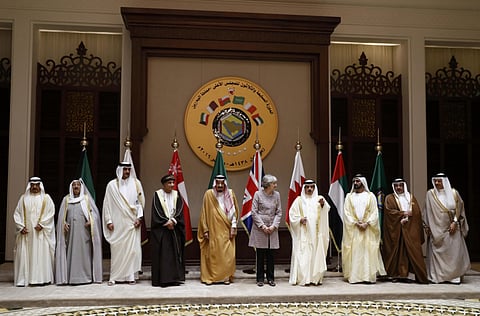GCC rejects Iran’s interference in the region
Leaders pledge to fight extremist ideologies that fed terrorism and distory Islam’s image

Manama: Gulf Cooperation Council (GCC) countries have rejected Iran’s interference in the domestic affairs of countries in the region and stressed they were absolutely committed to fighting extremist ideologies that fed terrorism and distorted Islam’s image.
The leaders of Bahrain, Kuwait, Oman, Qatar, Saudi Arabia and the United Arab Emirates, holding their 37th summit in Bahrain, called in their communiqué on Iran to comply fully with principles of good neighbourliness, to respect the sovereignty of other countries, not to interfere in the internal affairs of other countries and to refrain from using or threatening to use force.
The leaders said they rejected statements by Iranian officials against the GCC member countries and attempts to sow divisions among their people by inciting sectarianism.
“The GCC Supreme Council has called on Iran to immediately cease such practices that represent a violation of the sovereignty and independence of the GCC countries and to commit to the principles of good neighbourliness and to international laws, covenants and norms in order to preserve the security and stability of the region,” the communiqué said.
“The Supreme Council stresses that Iran should change its policy in the region by not harbouring terrorist groups on its soil, including the Hezbollah militias, not supporting terrorist militias in the region and not inciting sectarian divisions.”
The Supreme Council condemned the Iranian attempts to politicise Haj and to use the occasion to attack Saudi Arabia. It also condemned Iran’s interference in the internal affairs of the region, including Bahrain, through supporting terrorism, training terrorists, smuggling weapons, inciting sectarianism and issuing statements to undermine security, public order and stability the communiqué added.
It also underscored the need to make the Arabian Gulf and the Middle East free of all weapons of mass destruction, including nuclear weapons, but stressed the rights of countries to the peaceful use of nuclear energy.
The Supreme Council reiterated its firm stance denouncing Iran’s occupation of the three UAE islands while supporting the right of the UAE to its islands, regional waters, airspace, continental shelf and the economic zone of the three islands. The communiqué said that any decisions or activities carried out by Iran on the three UAE islands were void and null and did not change any of the historical or legal facts that affirmed the right of the UAE to the three islands.
It called on Iran to respond to the calls made by the UAE to resolve the issue through direct negotiations or resort to the International Court of Justice.
The Supreme Council reiterated its firm stance against terrorism and extremism and their rejection under all their forms and regardless of all motives, explanations and sources.
The Supreme Council said that it was fully committed to fighting extremist ideologies and ideas that were used by terrorist groups and stressed that tolerance and co-existence were among the most significant and values embraced by the GCC societies and used in dealing with other people.
Regarding the developments in Syria, the Supreme Council stressed their stance supporting preserving the unity, security and territorial integrity of the country.
The Supreme Council welcomed the condemnation by the Human Rights Council in September of the blatant and systematic violations in Syria by the Syrian political regime and its militias.
With regard to Yemen, the GCC highlighted its full commitment to the unity of Yemen, the respect of its sovereignty and independence and the rejection of any interference in its internal affairs.
The Supreme Council stressed the importance of a political solution in accordance with the Gulf initiative, the outcome of the National Dialogue Conference, and the unconditional implementation of United Nations Resolution 2216 (2015).
The Supreme Council said that the formation of a so-called national salvation government and political council by the Houthis and supporters of Abdulla Saleh were a violation of the internationally recognized constitutional legitimacy and represented obstacles to a political solution.
The Supreme Council reiterated their keenness on the unity, sovereignty, independence and territorial integrity of Iraq and their rejection of interference in its domestic affairs. They regretted statements by some Iraqi officials and media against some of the GCC countries and the use of Iraqi lands for training and smuggling weapons and explosives to the GCC.



